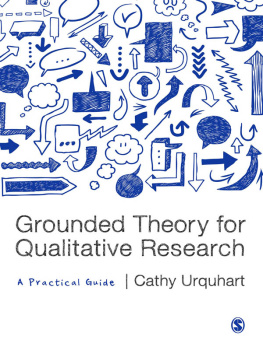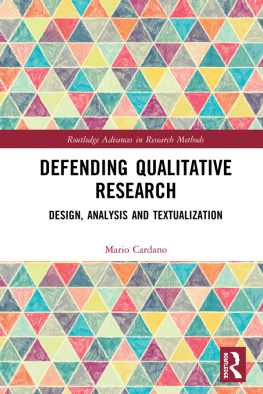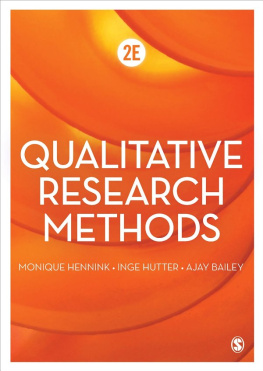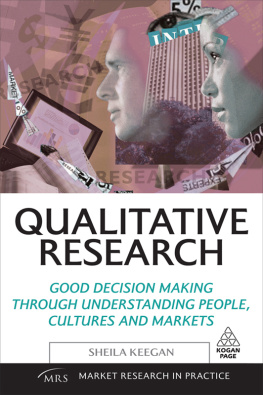Cathy Urquhart - Grounded Theory for Qualitative Research
Here you can read online Cathy Urquhart - Grounded Theory for Qualitative Research full text of the book (entire story) in english for free. Download pdf and epub, get meaning, cover and reviews about this ebook. year: 2012, publisher: SAGE Publications, genre: Politics. Description of the work, (preface) as well as reviews are available. Best literature library LitArk.com created for fans of good reading and offers a wide selection of genres:
Romance novel
Science fiction
Adventure
Detective
Science
History
Home and family
Prose
Art
Politics
Computer
Non-fiction
Religion
Business
Children
Humor
Choose a favorite category and find really read worthwhile books. Enjoy immersion in the world of imagination, feel the emotions of the characters or learn something new for yourself, make an fascinating discovery.
- Book:Grounded Theory for Qualitative Research
- Author:
- Publisher:SAGE Publications
- Genre:
- Year:2012
- Rating:3 / 5
- Favourites:Add to favourites
- Your mark:
- 60
- 1
- 2
- 3
- 4
- 5
Grounded Theory for Qualitative Research: summary, description and annotation
We offer to read an annotation, description, summary or preface (depends on what the author of the book "Grounded Theory for Qualitative Research" wrote himself). If you haven't found the necessary information about the book — write in the comments, we will try to find it.
Grounded Theory for Qualitative Research — read online for free the complete book (whole text) full work
Below is the text of the book, divided by pages. System saving the place of the last page read, allows you to conveniently read the book "Grounded Theory for Qualitative Research" online for free, without having to search again every time where you left off. Put a bookmark, and you can go to the page where you finished reading at any time.
Font size:
Interval:
Bookmark:
 | Connect with other researchers and discuss your research interests |
 | Keep up with announcements in the field, for example calls for papers and jobs |
 | Discover and review resources |
 | Engage with featured content such as key articles, podcasts and videos |
 | Find out about relevant conferences and events |

Qualitative Research


1 Olivers Yard
55 City Road
London EC1Y 1SP
2455 Teller Road
Thousand Oaks, California 91320
B 1/I 1 Mohan Cooperative Industrial Area
Mathura Road
New Delhi 110 044
3 Church Street
#10-04 Samsung Hub
Singapore 049483
Assistant editor: Anna Horvai
Production editor: Ian Antcliff
Copyeditor: Michelle Clark
Proofreader: Kate Harrison
Marketing manager: Ben Griffin-Sherwood
Cover design: Lisa Harper
Typeset by: C&M Digitals (P) Ltd, Chennai, India
Printed by: MPG Books Group, Bodmin, Cornwall

ISBN 978-1-84787-054-4 (pbk)
- introduces the purpose of the book, then gives a brief overview of GTM. It discusses the key features of GTM under four different headings Theory, GTM and the literature, Using GTM in the field, and Data analysis using GTM.
- gives some further background on GTM and how it has evolved into several different versions. This chapter considers some of the intellectual history of GTM. It also explores some myths about it that you may also encounter along the way.
- , where we look at coding in detail.
- too at types of data collection, the notion of reflexivity, the use of theoretical memos in the field and ethics.
- explains coding and conceptualisation in GTM, using two detailed worked examples. The chapter demonstrates open and selective coding through the two examples. It also discusses when to elevate an open code, and when to decide which codes are dimensions of other codes.
Font size:
Interval:
Bookmark:
Similar books «Grounded Theory for Qualitative Research»
Look at similar books to Grounded Theory for Qualitative Research. We have selected literature similar in name and meaning in the hope of providing readers with more options to find new, interesting, not yet read works.
Discussion, reviews of the book Grounded Theory for Qualitative Research and just readers' own opinions. Leave your comments, write what you think about the work, its meaning or the main characters. Specify what exactly you liked and what you didn't like, and why you think so.






